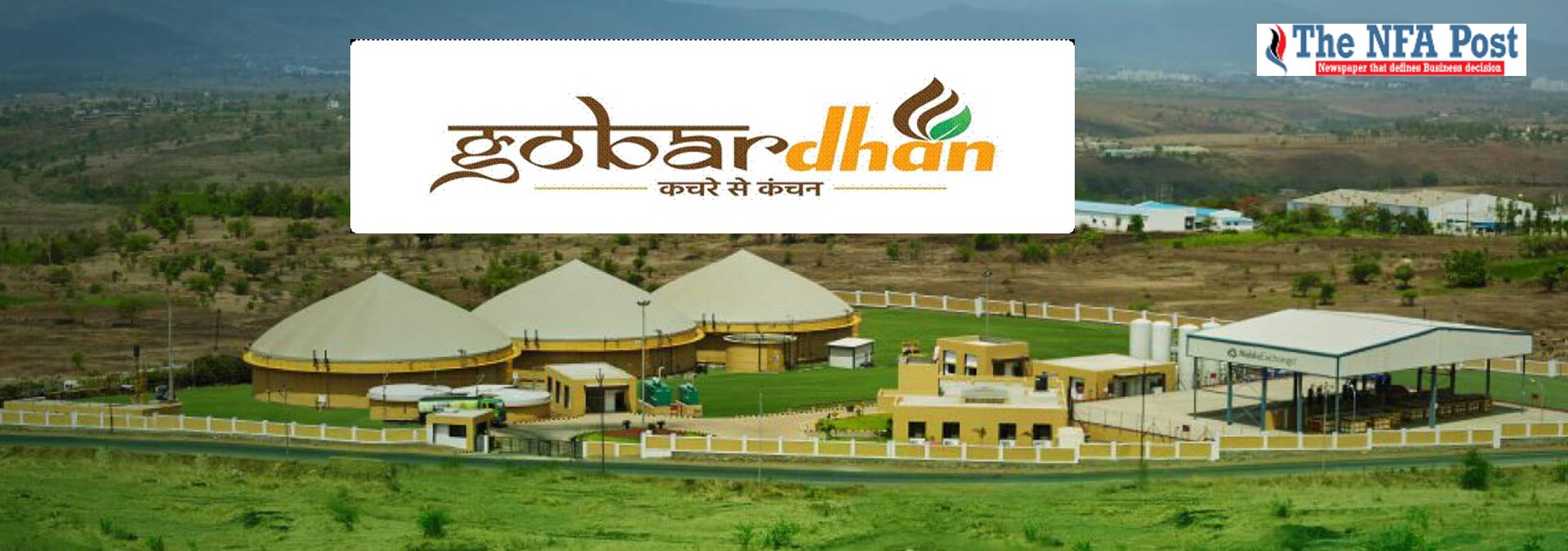536 Compressed Biogas (CBG) Plants and 1193 Biogas Plants registered on the Unified Registration Portal for GOBARdhan since its launch in June’23
GOBARdhan is a major multi-ministerial initiative of GoI aimed at converting biodegradable/ organic waste into valuable resources such as biogas, compressed biogas (CBG), and organic manure
The budget announcement 2023 provided a major fillip to this transformative initiative by announcing establishment of “500 new “waste to wealth” plants with an investment of Rs. 10,000 Crore.
New Delhi, NFAPost: Organic Bio-Agro Resources Dhan (GOBARdhan), an government initaitive to convert biodegradable/ organic waste, including cattle dung and agricultural residues and other biomass, into valuable resources such as biogas, compressed biogas (CBG), and organic manure, received overwhelming response as 198 plants were set up during FY2024.
As part of the major multi-ministerial initiative, GOBARdhan iniative established 12 Compressed Biogas (CBG) plants and 186 biogas plants. Further, 556 plants are under construction stage which include 129 CBG plants as well as 427 biogas plants.
The Government of India has taken several steps to promote the implementation of GOBARdhan initiative at speed and scale which inter alia includes/ following initiatives taken by the Government during the current year Financial Year :
CBG included in the list of activities for trading of carbon credits under bilateral/ cooperative approaches, 17th February 2023- This will help CBG plant owners to generate extra revenue through trading of carbon credits.
Central excise duty exemption has been provided to CNG blended with CBG from 2nd February, 2023 to prevent double taxation
Fertiliser Control Order (FCO) amendment notification has been issued by DA&FW for;
granting exemption for requirement of Authorization letter for sale of Fermented Organic Manure (FOM) /Liquid Fermented Organic Manure (LFOM) (organic manure produced from GOBARdhan plants) for a period of three year to boost uptake of LFOM/FOM.
raising the moisture content norms from 30-40 % to 30-70% in FOM.
Increase in C/N ratio from “less than 20” to “upto 30” and pH content in LFOM/FOM from “6.5-8.0” to “6.5-8.4”
Indian Council of Agricultural Research (ICAR) has prepared a report on “Utilisation of Bioslurry in various cropping systems” as well as package of practices for application of FOM/ LFOM for various crops to popularize benefits of FOM/LFOM on soil health and farm productivity
Market Development Assistance (MDA) Scheme approved and implementation started to incentivise sale and marketing of FOM/LFOM (a by-product from GOBARDhan plants) inter-alia promoting organic farming
Extension of CBG- CGD synchronization scheme of MoPNG for 10 years i.e. up to 2024 to strengthen production and consumption of CBG
Notification allowing bulk sale of FOM/ LFOM issued to ease marketing of FOM/LFOM by CBG plant operators and to promote organic farming
National Biofuel Coordination Committee (NBCC) has approved phase wise introduction of mandatory 5 % CBG blending to strengthen production and consumption of CBG
Unified Registration Portal for GOBARdhan has been developed by Department of Drinking Water and Sanitation and launched on 01st June, 2023 to streamline the registration of CBG and biogas plants nationwide and to monitor status of same.
The portal has been expanded upon stakeholder consultations to include various important functionalities such as “Functionality Assessment Module” to evaluate functionality status of plants, “Bank Loan Module” to track loan application status and get response from the banks.
Through the existing and upcoming policy enablers in the Biogas/CBG sector, the ultimate vision of Government is to expand the reach, awareness and implementation of Biogas/CBG plants and make the industry lucrative for private sector investment.
For more details visit: www.gobardhan.co.in
Last year November Union Minister for Petroleum & Natural Gas and Housing & Urban Affairs Hardeep Singh Puri announced CBG Blending Obligation (CBO) to promote production and consumption of Compressed Bio-Gas (CBG) in the country.
In a major step towards enhancing use and adoption of CBG, the National Biofuels Coordination Committee (NBCC), chaired by Union Petroleum Minister announced the introduction of phase wise mandatory blending of CBG in CNG (Transport) & PNG (Domestic) segments of CGD sector.
The key objectives of the CBO are to stimulate demand for CBG in CGD sector, import substitution for Liquefied Natural Gas (LNG), saving in Forex, promoting circular economy and to assist in achieving the target of net zero emission etc.
Highlighting the key outcomes of the CBO, Union Minister for Petroleum & Natural Gas and Housing & Urban Affairs Hardeep Singh Puri said that it will encourage investment of around Rs 37500 crores and facilitate establishment of 750 CBG projects by 2028-29.
It was, inter-alia, decided that: a. CBO will be voluntary till FY 2024-2025 and mandatory blending obligation would start from FY 2025-26. b. CBO shall be kept as 1%, 3% and 4% of total CNG/PNG consumption for FY 2025-26, 2026- 27 and 2027-28 respectively. From 2028-29 onwards CBO will be 5%.
A Central Repository Body (CRB) shall monitor and implement the blending mandate based on the operational guidelines approved by Minister, PNG. Discussions also took place for promoting production of ethanol from maize with all stake holders especially with Department of Agriculture and Department Food and Public distribution (DFPD) to make it a prominent feedstock in coming years.
It was discussed that the last few years there is increase in Maize cultivation area, yield per hectare and production. Work has been initiated by this ministry in consultation with Department of Agriculture and DFPD to further develop high starch yielding varieties, improve quality of maize DDGS (Dried Distillers Grain Solids) by removing aflatoxins, faster registration of new seed varieties with high starch.
To further promote maize training program for distillers with seed companies has also been initiated.
Sustainable Aviation Fuel (SAF/Bio- ATF) initial indicative blending percentage targets were set by the committee. Based on the comments received from the stakeholders, like MoCA, Niti Aayog, OMCs, etc., the capacities of Sustainable Aviation Fuel plants coming up in the country and projected ATF sales, the following initial indicative blending percentages of SAF in ATF are approved: 1% SAF indicative blending target in 2027 ( Initially for International flights) 2% SAF blending target in 2028 (Initially for International flights )





